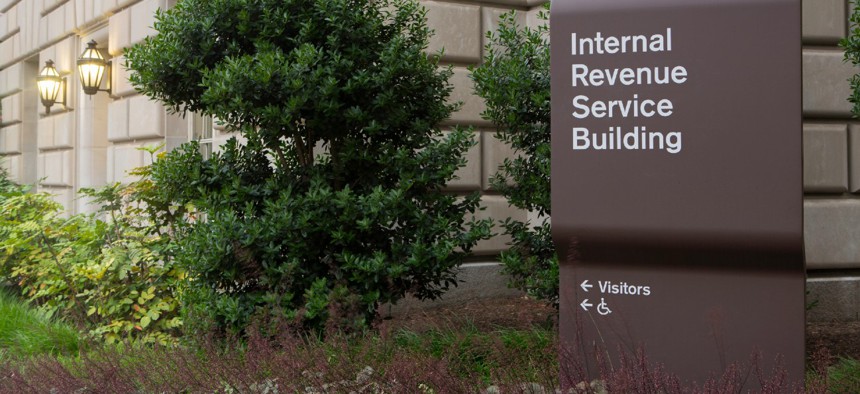
Skyhobo / iStock.com
Biden Seeks IRS Spending Surge to Reverse Years of Staffing Cuts
Funding would go toward hiring enforcement personnel focused on high-income taxpayers and customer service staff.
The Biden administration is seeking $80 billion for the Internal Revenue Service to boost its enforcement efforts as part of an effort to crack down on tax cheats and restore staffing at an agency that has seen its resources cut or stagnate for a decade.
President Biden proposed the dramatic funding increase as part of his American Families Plan, saying the spending—doled out over the next decade—would return at least $700 billion over the same period. The White House said it would allocate resources specifically for IRS to boost enforcement personnel focused on individuals making more than $400,000 annually, large corporations and other entities requiring “complex” investigations. The increased revenue would help offset the costs of a range of new policies Biden put forward on Wednesday, including expanded paid leave and increased access to free schooling.
IRS has shed 17,000 enforcement workers over the last decade, which represents only about half of the total workforce reduction since 2010. Its budget has decreased by 20% in that period, when adjusting for inflation.
A senior Biden administration official said the plan would provide the new IRS funding as part of “mandatory” spending, aiming to give the agency more certainty than the annual appropriations process typically offers. A Treasury spokesperson declined to specify the hiring targets the department would institute for IRS if the new funding were provided.
The shrinking workforce has had widespread impacts. In 2018, the number of cases IRS launched against non-filing individuals declined by 77% and those against businesses by 91%, compared to 2010. Treasury noted on Wednesday audits of those making more than $1 million annually have fallen by 80% over the last decade. IRS Commissioner Charles Rettig recently told lawmakers his agency is likely collecting about $1 trillion less than the federal government is owed in taxes every year, which he attributed in large part to insufficient personnel.
In a recent preview of his fiscal 2022 budget request, President Biden proposed a $1.2 billion, or 10.4%, increase for IRS. The White House said the funds would go specifically toward enhancing oversight of high-income and corporate tax returns, boosting other parts of tax enforcement and improving customer service. Treasury said the American Families Plan funding would similarly boost taxpayer services, noting Americans must “be able to interact with the IRS in an efficient and meaningful manner” but in recent years it has been “unable to provide taxpayers timely answers to their tax questions.” In addition to boosting its enforcement and customer service workforces, Treasury said IRS would ensure it can implement child tax credits and improve its antiquated IT systems.
Hiring could prove a challenge all on its own. IRS' human resources office has lost half of its hiring specialists since fiscal 2011. The HR team has engaged almost exclusively in transactional work and recently told auditors it did not know where its skill gaps are, as it has not used any workforce planning in recent years.
As it slashed IRS resources, Congress turned to the private sector to pick up slack for tax collection. Following a 2015 congressional mandate, the IRS contracted with four companies to provide collection of long-term outstanding debt. As of September 2018, private companies had been assigned 700,000 cases and collected $88.8 million, or 2% of the balance owed.
Biden’s proposal is similar to one recently unveiled by Sen. Elizabeth Warren, D-Mass., who suggested significantly increasing IRS funding while bringing some of that spending into the mandatory process. Such an approach would ensure the agency has a "predictable, sustained, and protected pot of funds dedicated to ensuring that the wealthy and that big corporations are paying their fair share," Warren said.
Sen. Chris Van Hollen, D-Md., who chairs the Senate Appropriations Committee panel that oversees IRS funding, applauded Biden’s proposal on Wednesday and announced he would soon hold a hearing on the agency’s enforcement capacity. The Committee for a Responsible Federal Budget, an organization that advocates deficit reduction, also praised the IRS plan and said it—unlike many other legislative proposals that claim a neutral impact—“truly will pay for itself.”
The Professional Managers Association, founded by IRS supervisors to represent the interests of non-bargaining unit personnel at the agency, said it should be a "no-brainer idea" to give IRS robust funding so it can enforce the law.
“It is unfair to taxpayers and employees alike to continue placing additional burdens on the Service without providing the funding needed to effectively administer the tax code,” said PMA Executive Director Chad Hooper. “Only by adequately investing in its workforce and technology can the IRS be transformed into a 21st century tax administration agency that will be better able to serve the American people with the agility expected in future national emergencies.”
The National Treasury Employees Union, which has for years pleaded with Congress to provide more resources to IRS, called Biden's proposal a "smart solution."
“The statistics show that when the IRS has a full staff of well-trained, professional civil servants answering taxpayer questions, conducting audits and deterring would-be cheaters, the entire tax system works more efficiently,” NTEU President Tony Reardon said.







